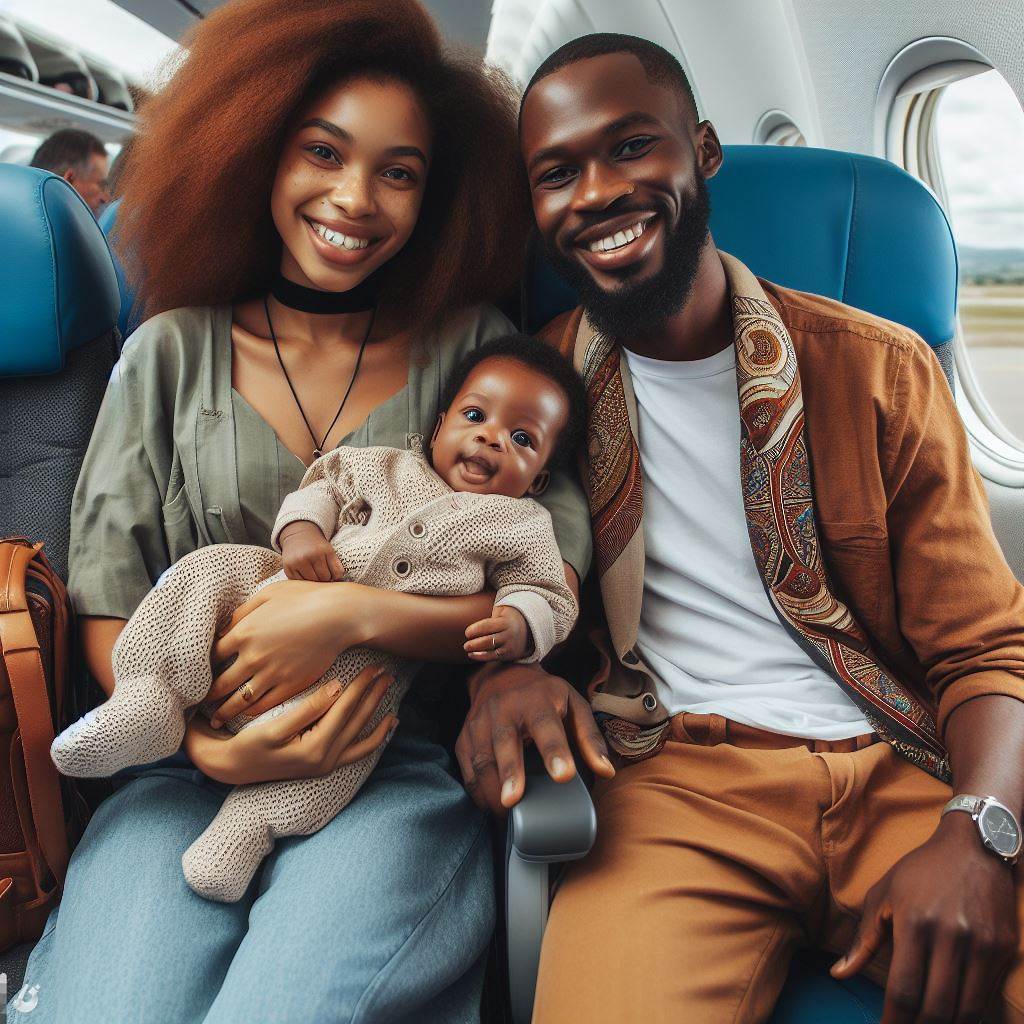Introduction
Traveling with a newborn in Nigeria can be challenging but also a rewarding experience.
The purpose of this blog post is to provide Nigerian tips for traveling with a newborn.
Traveling with a newborn requires careful planning and preparation to ensure their comfort and safety.
One of the most important things to consider when traveling with a newborn is their sleeping arrangements.
It is recommended to bring a travel crib or a portable bed for the baby to sleep in.
In addition to sleeping arrangements, it is crucial to pack essential items such as diapers, formula, and baby clothes.
It is advised to bring extra supplies in case of unforeseen circumstances or emergencies during the trip.
When traveling by car, it is vital to have a properly installed car seat that is appropriate for the baby’s age and size.
To make the journey more comfortable, frequent breaks should be taken to feed, change diapers, and allow the baby to stretch.
It is essential to bring necessary documents such as birth certificates and immunization records when traveling with a newborn.
Lastly, it is essential to be mindful of the baby’s health by avoiding crowded and unsanitary places.
In essence, traveling with a newborn in Nigeria requires careful planning, preparation, and consideration for the baby’s well-being.
By following these Nigerian tips, parents can ensure a smooth and enjoyable journey with their newborn.
Pre-Travel Preparations
Traveling with a newborn requires careful planning and preparation to ensure a smooth journey and a comfortable experience for both the baby and the parents.
In this section, we will explore the pre-travel preparations that Nigerian parents should undertake before embarking on a journey with their newborn.
Parenting Made Just for You
Get personalized Parenting Solutions tailored to your child’s needs. Transform your parenting journey with expert guidance in 1-3 days.
Get StartedResearch the destination
Researching the destination is a crucial step in preparing for a trip with a newborn.
Nigerian parents should find out about the weather conditions at the destination as it will help them pack appropriate clothing and accessories for their baby.
Additionally, understanding the local customs and cultural norms will help parents navigate through their travel experience smoothly.
Moreover, it is important to research whether the destination provides necessary facilities for newborns, such as diaper changing areas, nursing rooms, or stroller-friendly paths.
Ensure the baby’s passport and travel documents are in order
Ensuring that the baby’s passport and travel documents are in order is essential to avoid any last-minute hassles.
Nigerian parents should ensure that their baby’s passport is valid and will not expire during the planned trip.
Additionally, any required visas or other travel documents should be obtained well in advance to prevent any unnecessary delays or complications.
Pack the necessary items for the baby
Packing the necessary items for the baby is another crucial step for a successful trip.
Nigerian parents should pack sufficient clothing for their newborn, considering the weather conditions at the destination.
It is always a good idea to bring extra layers, especially for unpredictable weather. Don’t forget to pack enough diapers, feeding supplies, and formula if needed.
Bringing a few favorite toys or comfort items will help keep the baby entertained during the journey.
Additionally, make sure to pack any required medications and health supplies for the baby’s specific needs.
Consult the baby’s pediatrician before traveling
Consulting the baby’s pediatrician before traveling is highly recommended.
Nigerian parents should schedule a visit to their baby’s pediatrician to discuss any health concerns related to the trip.
Unveil the Perfect Name that Tells Your Family's Story
Let us help you find a name that embodies your family's values, traditions, and dreams. Our personalized consultation weaves cultural insights to create a name that's uniquely yours.
Get StartedThe pediatrician can provide valuable advice on dealing with common travel challenges and may recommend specific preventive measures or vaccinations based on the destination.
It is essential to ensure that the baby’s vaccinations are up to date to protect them from any potential health risks.
By following these pre-travel preparations, Nigerian parents can ensure a safe and enjoyable trip with their newborn.
Adequate research and planning, organizing important travel documents, packing necessary items, and consulting the baby’s pediatrician will help create a positive travel experience for both the parents and the newborn.
Read: Baby Milestones: What to Look For
Choosing the Mode of Transportation
When it comes to traveling with a newborn in Nigeria, choosing the right mode of transportation is crucial.
It affects not only the comfort and well-being of the baby but also the overall travel experience for parents.
Let’s explore some factors to consider when deciding on the mode of transportation.
Consider the pros and cons of different transportation options
Before embarking on a journey, it is essential to weigh the advantages and disadvantages of various transportation modes.
Air travel is convenient but can be expensive and may subject infants to changes in pressure during takeoff and landing.
On the other hand, traveling by car allows more flexibility and control over the environment, but long hours on the road might be tiring for both parents and the baby.
Buses and trains are cost-effective alternatives, yet they may lack certain amenities needed for newborns.
Check the safety measures and facilities available for newborns
Ensuring the safety and comfort of your newborn is non-negotiable.
Before finalizing your transportation choice, research the safety measures and facilities available for infants.
Airlines providing infant bassinets or car seats can be a plus. Car rentals or taxi services should have appropriate infant car seats.
Buses or trains should have secure seating arrangements for newborns.
Plan the timing of travel
Timing your travel is crucial when taking a newborn along. It is best to choose a time that aligns with the baby’s sleep schedule.
Traveling during their naptime can help minimize disturbances and create a more peaceful journey.
Plan for breaks during long trips to allow diaper changes, feeding, and stretching for both the baby and parents.
Be prepared for any unexpected delays or emergencies during the journey
Regardless of the mode of transportation, it is essential to anticipate and be prepared for any unexpected delays or emergencies.
Carry extra baby essentials such as diapers, wipes, formula/milk, and a change of clothes.
Pack medications, if needed, along with a first aid kit. Keep important contact numbers ready in case of emergencies.
In fact, choosing the right mode of transportation when traveling with a newborn in Nigeria requires careful consideration.
Evaluate the pros and cons of each option, ensure the availability of safety measures and facilities for your baby, plan your travel timing accordingly, and be prepared for any unexpected delays or emergencies.
By doing so, you can ensure a smooth and comfortable journey for both you and your little one.
Read: Coping with Colic: Tips and Tricks
On the Day of Travel
When traveling with a newborn, it’s crucial to dress them in comfortable and weather-appropriate clothing to ensure their well-being throughout the journey.
Pack extra supplies for emergencies
Always be prepared for any unforeseen circumstances by packing extra supplies. This includes diapers, wipes, formula/breastmilk, and a change of clothes.
- Diapers: It’s essential to have an adequate supply of diapers to cater to your baby’s needs during the entire trip.
- Wipes: Remember to pack enough wipes to keep your baby clean and fresh throughout the journey.
- Formula/Breastmilk: If you’re not exclusively breastfeeding, make sure to carry enough formula or breastmilk for the duration of your travels.
- Change of clothes: Accidents can happen, so having an extra set of clothes is crucial in case your baby needs to be changed unexpectedly.
Whether you choose to breastfeed or bottle-feed, it’s important to plan ahead and ensure you have all the necessary equipment and supplies.
Keep important documents and items easily accessible
To avoid any last-minute hassles, keep all your important documents and items easily accessible throughout your journey.
- Passports: Make sure to have your baby’s passport readily available, especially during check-in and immigration procedures.
- Tickets: Keep your travel tickets within reach to avoid any unnecessary delays or confusion.
- Identification: Carry identification documents for yourself and your baby, such as birth certificates or medical records.
- Medications: If your baby requires any medications, always keep them easily accessible in case of emergencies or regular dosages during the journey.
Safety and Health Tips
Ensure the baby’s car seat or appropriate travel gear is of high-quality and installed correctly
Selecting the appropriate travel gear for your newborn in Nigeria is crucial.
Ensure the safety and quality of the car seat or travel equipment you choose. Research extensively and opt for gear that complies with safety standards.
The market offers various options designed specifically for newborns.
Choose gear that provides optimal protection and comfort, considering factors such as size, weight, and durability.
Once you’ve chosen the gear, follow the manufacturer’s instructions meticulously to install it correctly in your vehicle.
Seek professional help if needed to ensure the utmost safety for your little one.
Protect the baby from exposure to germs
Nigeria, like any other place, has its share of germs and potential health risks.
Prioritize your baby’s health by carrying sanitizers and wipes whenever you’re out and about.
Keep your hands clean before handling your baby, especially during feeding or diaper changes.
Avoid crowded places where germs can easily spread. Consider using a baby carrier or stroller with a cover to shield your newborn from direct contact with strangers or public surfaces.
While it’s essential for your baby to socialize, try to limit exposure in crowded areas, especially during the early months when their immune system is developing.
Pay attention to the baby’s comfort during the journey
Travelling with a newborn requires frequent breaks for feeding, changing diapers, and allowing your baby to stretch.
Plan your journey with these breaks in mind. Find safe and comfortable spots to stop along your route.
Create a cozy environment for your baby within the travel gear.
Carry essential items like extra diapers, blankets, and toys to keep your baby comfortable and entertained during the trip.
Adjust the temperature within the car to ensure your baby’s comfort, as they can be sensitive to changes in temperature.
Be cautious about the baby’s food and water sources
Maintain caution regarding your baby’s food and water sources. Stick solely to bottled water and avoid tap water, even for mixing formula.
Ensure that any water used for preparing your baby’s food is safe and purified.
Additionally, when it comes to food, opt for freshly prepared or packaged items from reputable sources.
Avoid street food, as it might not adhere to hygiene standards. Stick to foods that are easily digestible and suitable for your baby’s age.
Taking proactive measures and being attentive to these safety and health tips can significantly enhance the experience of traveling with your newborn in Nigeria.
By carefully selecting travel gear, shielding your baby from germs, prioritizing their comfort, and being mindful of food and water sources, you can ensure a safer and more enjoyable journey for both you and your little one.
Read: Baby’s First Vaccinations: What to Expect

Settling In at the Destination
Create a safe sleeping environment for the baby
- Choose a crib or bassinet that meets safety standards.
- Place the baby’s bed away from any hazards like cords, blinds, or heavy objects.
- Ensure the room temperature is comfortable for the baby.
- Use a fitted sheet on the mattress and avoid placing pillows or blankets in the crib.
- Keep the sleeping area free from smoke, pets, and other potential allergens.
Maintain the baby’s routine as much as possible
- Stick to the usual feeding and sleeping schedule as closely as possible.
- Try to recreate familiar surroundings by bringing favorite toys or blankets.
- Keep the daily activities consistent to provide a sense of stability for the baby.
- Minimize changes in routines, such as nap timings or meal preferences, if possible.
- Be flexible and understand that some adjustments may be necessary during travel.
Find suitable places for breastfeeding or bottle-feeding
- Research and identify family-friendly locations with private spaces for nursing.
- Carry a nursing cover or shawl to ensure privacy while breastfeeding in public.
- If bottle-feeding, ensure you have access to clean water and sterilization facilities.
- Consider carrying pre-measured formula in travel-friendly containers for convenience.
- Check the local regulations and customs regarding breastfeeding in public.
Plan activities suitable for the newborn and family
- Engage in gentle sightseeing activities that are not overly stimulating for the baby.
- Visit parks, gardens, or beaches where the baby can enjoy some fresh air and nature.
- Avoid crowded places or attractions that may be overwhelming for the newborn.
- Choose baby-friendly activities like visiting museums with dedicated infant areas.
- Plan breaks to accommodate the baby’s feeding, diaper changes, and nap times.
Remember that every baby is different, and it’s important to observe their cues and adjust accordingly.
It may take some time for both you and your newborn to settle into the new environment, so be patient and give yourselves some grace.
Enjoy the journey and make unforgettable memories with your little one!
Read: Postpartum Health for Nigerian Mothers
Cultural Tips for Traveling with a Newborn in Nigeria
Respect local customs and traditions
- Observe and follow local customs and traditions when interacting with people.
- Take the time to research and understand the specific customs of the region you will be visiting.
- Be mindful of local dress codes and etiquette to avoid offending locals.
Be aware of the local attitudes towards breastfeeding in public
- Understand that attitudes towards breastfeeding in public may vary in Nigeria.
- It is important to be respectful and mindful of local customs and beliefs regarding breastfeeding.
- Consider finding private and comfortable spaces when breastfeeding your newborn.
Learn a few basic phrases in the local language to communicate with locals
- Take the time to learn some basic greetings and phrases in the local language.
- This will help you connect with locals and show respect for their culture.
- Simple phrases like “hello,” “thank you,” and “please” can go a long way in establishing rapport.
Conclusion
Traveling with a newborn in Nigeria requires careful planning and preparation.
Make sure to pack all the necessary baby essentials, such as diapers, wipes, and formula.
Take into consideration the climate and cultural customs when selecting appropriate clothing for your baby.
Plan your itinerary with your baby’s feeding and sleeping schedule in mind to avoid unnecessary stress.
Stay organized by keeping important documents, such as birth certificates and immunization records, easily accessible.
Utilize baby-friendly transportation options and be aware of the safety regulations.
Always prioritize your baby’s comfort and well-being during the journey.
Additional resources and tips for traveling with a newborn in Nigeria can be found on parenting websites and forums.
If you have any experiences or further tips for traveling with a newborn in Nigeria, we encourage you to share them in the comments section below.
Together, we can help create a valuable resource for parents embarking on this adventure with their little ones.




